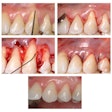A protein involved in cellular inflammation may increase the risk of plaque-containing blood vessels associated with periodontal disease, according to research presented April 18 at the American Heart Association's Arteriosclerosis, Thrombosis, and Vascular Biology 2012 Scientific Sessions in Chicago.
The protein, CD36, is found in blood cells, as well as many other cell types. Previous research has shown that CD36 may increase the harmful effects of low-density lipoprotein.
For this study, researchers from the Cleveland Clinic deleted the gene responsible for CD36 production, and then induced plaque in blood vessels by feeding mice a high-fat diet. Some animals were also infected with the bacteria associated with periodontal disease.
More fatty plaque accumulation occurred in the blood vessels of the animals that were infected with periodontal disease, the researchers reported. In the animals with the deleted CD36 gene, however, vessels remained free of new plaque even when oral inflammation occurred.



















